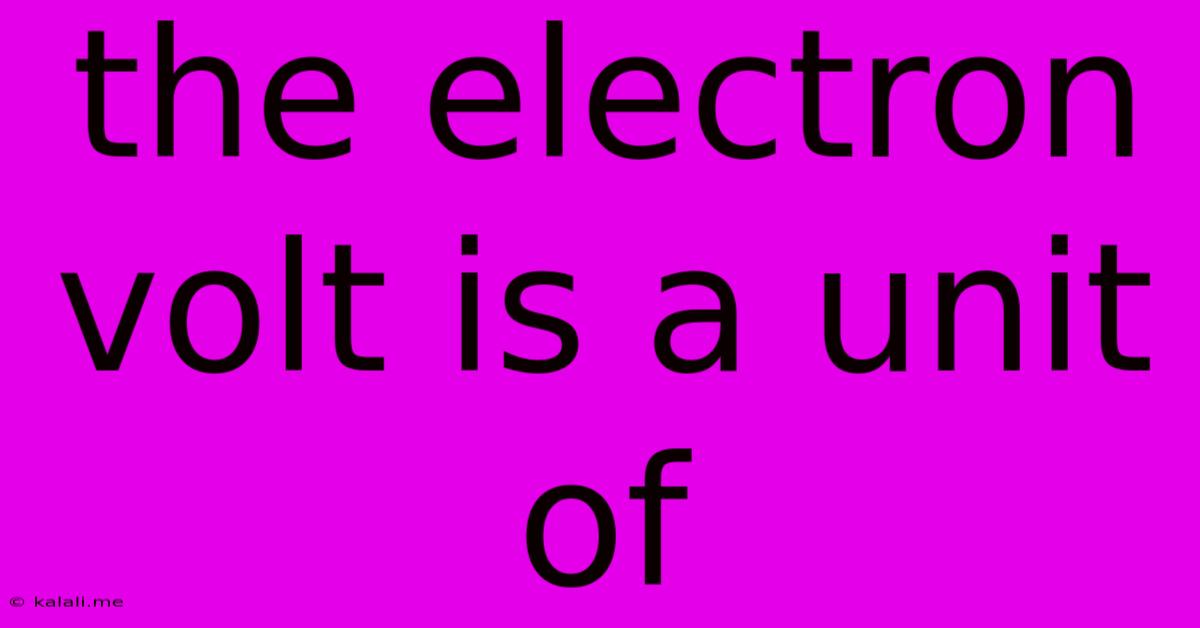The Electron Volt Is A Unit Of
Kalali
Jun 12, 2025 · 3 min read

Table of Contents
The Electron Volt: A Unit of Energy
The electron volt (eV) is a unit of energy, commonly used in atomic, nuclear, and particle physics. It represents the amount of kinetic energy gained by a single electron accelerating through an electric potential difference of one volt in a vacuum. Understanding what an electron volt is requires grasping its fundamental connection to electric potential and the properties of charged particles. This article will delve into the definition, applications, and significance of the electron volt in various scientific fields.
Defining the Electron Volt
At its core, the electron volt is a derived unit, meaning it's defined in terms of other fundamental units. The energy gained by a charged particle is directly proportional to the charge of the particle and the potential difference it traverses. For an electron with a charge of approximately 1.602 x 10⁻¹⁹ Coulombs, accelerating across a potential difference of 1 Volt results in an energy gain of precisely 1 electron volt. This relationship can be expressed mathematically as:
Energy (in eV) = Charge (in Coulombs) x Potential Difference (in Volts)
While seemingly simple, this definition has profound implications for understanding particle interactions at the atomic and subatomic levels.
Why Use Electron Volts?
The electron volt is particularly useful in these fields because it simplifies calculations involving the energies of charged particles. The energies involved in atomic and nuclear processes are often very small when expressed in Joules (the standard SI unit of energy). Using electron volts provides a more manageable and intuitive scale for these interactions.
For example, the ionization energy of hydrogen (the energy required to remove an electron from a hydrogen atom) is approximately 13.6 eV. Expressing this energy in Joules would result in a much smaller and less user-friendly number.
Applications of Electron Volts
The electron volt finds widespread application in several areas of physics and related fields:
- Atomic Physics: Describing ionization energies, excitation energies of atoms, and interactions between atoms and photons.
- Nuclear Physics: Characterizing nuclear reactions, binding energies of nuclei, and the energies of emitted particles (like alpha particles and beta particles).
- Particle Physics: Measuring the energies of particles in accelerators, analyzing collisions, and understanding the properties of elementary particles.
- Materials Science: Studying electron interactions within materials, including band gaps in semiconductors and electron emission phenomena.
- Medical Physics: Describing the energy of radiation used in medical imaging and radiotherapy.
Electron Volt and its Relation to Other Energy Units
It's important to remember that the electron volt, while extremely useful in its respective fields, is still a unit of energy. It can be converted to other energy units, such as Joules, using the following conversion factor:
1 eV = 1.602 x 10⁻¹⁹ Joules
Conclusion
The electron volt is a crucial unit of energy, especially in fields that deal with microscopic particles and their interactions. Its intuitive scale and direct relationship to electric potential make it indispensable for understanding the complexities of the atomic and subatomic world. From atomic transitions to high-energy particle collisions, the electron volt provides a clear and concise method for quantifying energy at these scales.
Latest Posts
Latest Posts
-
How Many Atoms Are In O
Jun 13, 2025
-
How Far Would The Nurse Depress The Lower Sternum
Jun 13, 2025
-
In The Figure Line M Is Parallel To Line N
Jun 13, 2025
-
Truth Table For 3 Input And Gate
Jun 13, 2025
-
The Study Of Universe Is Called
Jun 13, 2025
Related Post
Thank you for visiting our website which covers about The Electron Volt Is A Unit Of . We hope the information provided has been useful to you. Feel free to contact us if you have any questions or need further assistance. See you next time and don't miss to bookmark.